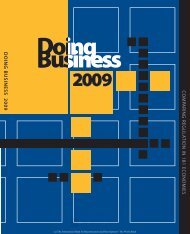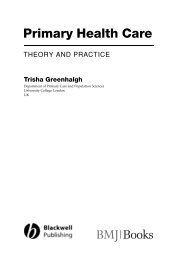Download File - JOHN J. HADDAD, Ph.D.
Download File - JOHN J. HADDAD, Ph.D.
Download File - JOHN J. HADDAD, Ph.D.
You also want an ePaper? Increase the reach of your titles
YUMPU automatically turns print PDFs into web optimized ePapers that Google loves.
74 Teofilovici and Wentworth<br />
Liponova completed a phase 3 trial of Reniale, involving 558 patients with<br />
nonmetastatic RCC. Although the majority of clinical research indicates greater<br />
benefit of cancer vaccines among patients with earlier-stage disease, a subset<br />
analysis of the phase 3 trial found a significant reduction in tumor progression<br />
for patients with T3 tumors but not those with T2 tumors (21). Five-year progression-free<br />
survival (PFS) was 81.3% for patients with T2 tumors who<br />
received vaccine (n ¼ 119) versus 74.6% for similar patients in the control arm<br />
(n ¼ 145; P ¼ 0.216). For patients with T3 tumors, five-year PFS was 67.5% for<br />
those in the vaccine arm (n ¼ 58) compared with 49.7% for those in the control<br />
arm (n ¼ 57; P ¼ 0.039). Liponova provided an updated report with additional<br />
OS data (22). This secondary intent-to-treat (ITT) analysis was performed on<br />
477 patients (233 patients in the treatment group and 244 patients in the control<br />
group). PFS remained in favor of the Reniale group (P ¼ 0.0476, log-rank test),<br />
with no statistically significant OS difference between both groups. In the<br />
per protocol group, there remained 134 patients in the Reniale group and<br />
218 patients in the control group where both PFS and OS were statistically<br />
significant in favor of the Reniale group (P ¼ 0.024, log-rank test, for PFS; and<br />
P ¼ 0.0356, log-rank test, for OS, respectively).<br />
Provenge 1 (Sipuleucel-T; Dendreon, Seattle, WA, U.S.)<br />
Provenge consists of autologous (patient-derived) DC that have been cultured with<br />
a “delivery cassette” that contains a version of the prostate cancer–associated<br />
antigen prostatic acid phosphatase (PAP) (found in about 95% of prostate cancers)<br />
and the cytokine granulocyte-macrophage colony-stimulating factor (GM-CSF). It<br />
is designed to activate specialized immune cells called T cells to recognize and<br />
destroy cells bearing the PAP antigen. In contrast to personalized vaccines using<br />
patient’s own tumor to derive a large repertoire of antigens, Provenge uses a<br />
generic antigen common in prostate carcinoma. A phase 3 trial of Provenge<br />
involving 127 patients with asymptomatic, androgen-independent, metastatic<br />
prostate cancer (study D9901) missed the primary end point of time to progression.<br />
However, the final three-year follow-up data showed a median survival benefit of<br />
21%, or 4.5 months, and a threefold improvement in survival at 36 months<br />
compared with placebo, regardless of Gleason score (P ¼ 0.010; HR ¼ 1.7) (23).<br />
A second phase 3 trial (study D9902A), involving 98 men with asymptomatic,<br />
metastatic, androgen-independent prostate cancer, corroborated findings<br />
from the first trial: Patients who received vaccine had a 19.0-month median survival<br />
time compared with 15.7 months for patients who received placebo, representing<br />
a 21% improvement (P ¼ 0.331; HR ¼ 1.3). Integrated analysis of data<br />
from both trials showed a statistically significant survival benefit among the overall<br />
ITT population of 225 patients: Patients who received Provenge had a median<br />
survival of 23.2 months compared with 18.9 months for patients who received<br />
placebo (P ¼ 0.011; HR ¼ 1.5) (24). A third, pivotal phase 3 trial (study D9902B)<br />
is ongoing to evaluate Provenge as a treatment for advanced prostate cancer.

















